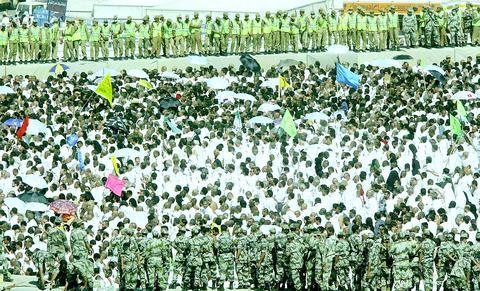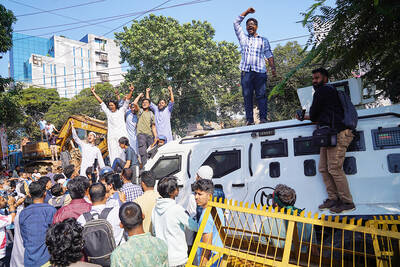King Fahd of Saudi Arabia ordered the holy places of Mecca and Medina to be modernized hours after 244 Muslims -- half of them Asians -- died during a ritual that regularly results in deadly stampedes at the hajj pilgrimage.
The 20-year project, announced by royal decree, would be drawn up by ministers and senior regime officials who would "gradually put forward proposals" and could call on expertise from abroad as well as within the kingdom, the official Saudi Press Agency said.
The 244 dead and a similar number injured were trampled or suffocated as a huge crush started Sunday when vast numbers of pilgrims surged forward to lob stones at pillars representing the devil.

PHOTO: EPA
The ritual involving up to 1.9 million white-robed pilgrims was due to continue in the valley of Mina, just outside Mecca, for the second day, starting around midday.
It promised to be a further high-risk exercise for the Saudi authorities who had nonetheless announced last month an "integrated crowd control strategy" to prevent new tragedies during the annual event.
Pilgrims were to be dispatched in groups for the rite at a huge two-tier bridge, limitations imposed on the numbers heading toward the area and special forces deployed immediately to disperse people in case of a stampede.
The faithful were also to be told to leave the area quickly after completing the ritual while arrangements had been made to rescue pilgrims who faint or become trapped due to overcrowding. The movement of pilgrims was also to be monitored via closed-circuit television.
Last year 14 pilgrims were killed in a stampede during the first day of the same ritual and 35 in 2001, while the 1998 hajj saw 118 killed and more than 180 hurt at the pillars.
Asians bore the brunt of the latest disaster with 54 Indonesians and 36 Pakistanis among the dead, the Saudi interior ministry said.
"We believe that most of the dead are from among illegal pilgrims," Hajj Minister Madani said, referring to those who arrived earlier in the year to perform the minor umrah pilgrimage and stayed illegally, as well as local residents who never registered for the hajj.
He said 2,000 national guard members were moved to the area following the stampede to reinforce 10,000 police already on site.
Despite the stampede, which lasted nearly half an hour, the ritual resumed later Sunday and continued for two and a half hours.
To cries of "Allahu Akbar," pilgrims hurl seven small stones from behind a fence or from the overhead bridge every day for three days at each of the three 18m-high concrete pillars that symbolize Satan.
The pillars stand only 155m apart.
They are generally mobbed as the pilgrims try to get close despite the beefed-up security measures.
According to tradition, Satan appeared on the same site to the Prophet Abraham, his son Ismael and wife Hagar.
Each threw seven stones at the devil.
Pilgrims who were at the rite on Sunday gave varying accounts of what took place but all said they would not be deterred.
"I was there and saw 30 to 40 bodies on the ground. But I don't know if they were dead or unconscious," said one young Saudi who declined to give his name.
"What happened this morning did not stop the accomplishing of the hajj rituals. The pilgrims continued to rush in," added Waleed Faydullah, a 32-year-old Egyptian.
The first two days of the pilgrimage had passed without incident -- although authorities said they arrested in Riyadh on Thursday seven suspected members of a "terror group" planning an attack.
The worst toll of the pilgrimage was in July 1990, when 1,426 pilgrims were trampled or asphyxiated to death in a tunnel in Mina.

DISASTER: The Bangladesh Meteorological Department recorded a magnitude 5.7 and tremors reached as far as Kolkata, India, more than 300km away from the epicenter A powerful earthquake struck Bangladesh yesterday outside the crowded capital, Dhaka, killing at least five people and injuring about a hundred, the government said. The magnitude 5.5 quake struck at 10:38am near Narsingdi, Bangladesh, about 33km from Dhaka, the US Geological Survey (USGS) said. The earthquake sparked fear and chaos with many in the Muslim-majority nation of 170 million people at home on their day off. AFP reporters in Dhaka said they saw people weeping in the streets while others appeared shocked. Bangladesh Interim Leader Muhammad Yunus expressed his “deep shock and sorrow over the news of casualties in various districts.” At least five people,

LEFT AND RIGHT: Battling anti-incumbent, anticommunist sentiment, Jeanette Jara had a precarious lead over far-right Jose Antonio Kast as they look to the Dec. 14 run Leftist candidate Jeannette Jara and far-right leader Jose Antonio Kast are to go head-to-head in Chile’s presidential runoff after topping Sunday’s first round of voting in an election dominated by fears of violent crime. With 99 percent of the results counted, Jara, a 51-year-old communist running on behalf of an eight-party coalition, won 26.85 percent, compared with 23.93 percent for Kast, the Servel electoral service said. The election was dominated by deep concern over a surge in murders, kidnappings and extortion widely blamed on foreign crime gangs. Kast, 59, has vowed to build walls, fences and trenches along Chile’s border with Bolivia to

DEATH SENTENCE: The ousted leader said she was willing to attend a fresh trial outside Bangladesh where the ruling would not be a ‘foregone conclusion’ Bangladesh’s fugitive former prime minister Sheikh Hasina yesterday called the guilty verdict and death sentence in her crimes against humanity trial “biased and politically motivated.” Hasina, 78, defied court orders that she return from India to attend her trial about whether she ordered a deadly crackdown against the student-led uprising that ousted her. She was found guilty and sentenced to death earlier yesterday. “The verdicts announced against me have been made by a rigged tribunal established and presided over by an unelected government with no democratic mandate,” Hasina said in a statement issued from hiding in India. “They are biased and politically motivated,” she

It is one of the world’s most famous unsolved codes whose answer could sell for a fortune — but two US friends say they have already found the secret hidden by Kryptos. The S-shaped copper sculpture has baffled cryptography enthusiasts since its 1990 installation on the grounds of the CIA headquarters in Virginia, with three of its four messages deciphered so far. Yet K4, the final passage, has kept codebreakers scratching their heads. Sculptor Jim Sanborn, 80, has been so overwhelmed by guesses that he started charging US$50 for each response. Sanborn in August announced he would auction the 97-character solution to K4